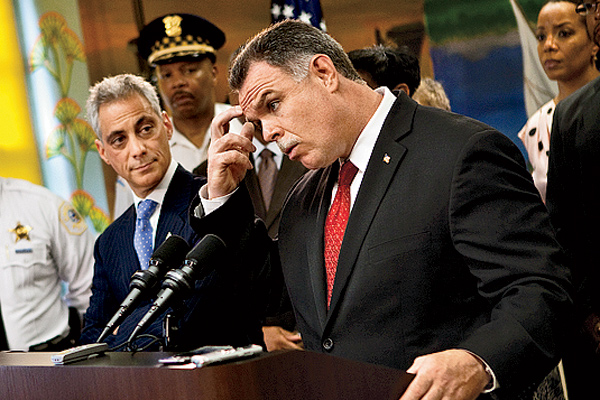
I was both surprised and not surprised to read this today, in an argument about why Chicago should take another shot at the Olympics: "These are dark days for Chicago. After living here for 33 years, I cannot recall a time where I've heard of so many shootings and deaths and just overall anger."
Through the first half of the year there were 250 homicides in Chicago—up 36 percent from last year, and the first time the city's reached that point halfway through the year since 2003. But it's hard to imagine someone not hearing as much about shootings prior to this year; in 2003, Chicago finished the year with 598 homicides, the first time it had fewer than 600 in many years. A decade prior to that, Chicago was in the midst of a four-year streak with over nine hundred murders per year, more than twice the numbers recorded in 2010 and 2011.
But it's ultimately not surprising. Americans have believed that there's been more crime than last year every year for two decades. If this was true, we'd basically all be criminals at this point, but it's a powerful perception (via Mark Bergen):
Research by my University of Chicago colleague Steve Levitt and Julie Cullen of the University of California, San Diego, showed that for every homicide that occurs in a city, total population declines by 70 people. The 2010 census showed that Chicago had shrunk by 200,000 people in the past decade. If Chicago had New York's success in controlling violence (that city's homicide rate is about one-third ours right now, even though our rates were similar in the early 1990s), Chicago's population would have held steady or even grown the past 10 years.
That paper is from 1996: "Crime, Urban Flight, and the Consequences for Cities." It would be interesting to see how the approach holds up after the post-'90s decline, but this seems to match with what I've seen, read, and heard: "Those households that leave the city because of crime are much more likely to remain within the SMSA [Standard Metropolitan Statistical Area] than those leaving the city for other reasons." While Chicago has essentially shrunk since 1950, the Chicago MSA nearly doubled in population over that period.
So I think it's possible that Chicago can simultaneously have a "perception" problem and an actual problem. In his new profile of Garry McCarthy, written in the midst of the city's homicide surge, Noah Isackson addresses the policing issues involved:
[I]t’s hard to argue with the effectiveness of specialized units. Consider what happened when [Phil] Cline began using them to target gangs, guns, and drugs in certain neighborhoods on the South and West Sides. Chicago went from being the murder capital of the nation in 2003, with 601 people killed, to 453 the next year (see "Murder Capital of America?"). That was the first time since the 1960s that fewer than 500 murders had been recorded.
Homicides remained under the 500 mark until 2008. The previous fall, in the wake of ongoing scandal involving the rogue officers, Dana Starks, the interim superintendent between Cline and [Jody] Weis, shelved the specialized units. Homicides began to rise. After Weis took the job, he convinced Mayor Daley in September 2008 to reinstate the units, promising that, as chief, he’d implement better training and more accountability.
According to Weis, the city’s sub-500 murder totals in 2009, 2010, and 2011 were a direct result of that decision. “Sometimes the answer is staring you right in the face,” he says.
Fewer specialized units is also a response to a decline in manpower, something the Reader's Ben Joravsky wrote a must-read 2010 story about for the Reader (and manpower is considered one of the strongest deterrents, if not the strongest). Isackson finds the two are tied together:
The two units McCarthy reassigned, the Mobile Strike Force and the Targeted Response Unit, had been directed to bust up gangs, but Emanuel needed the extra manpower to keep his campaign promise. The 500 officers in those units were assigned beats in various districts.
Manpower has been a problem—both a perception problem and, it would seem, an actual problem. And that's why, Joravsky and Mick Dumke discovered, we just got a marijuana-decriminalization ordinance. The idea had been floating around City Hall for months, but the increase in homicides cast a light on CPD manpower levels, and all of a sudden the idea looked not merely sensible but necessary, another example of Rahm Emanuel not letting a crisis go to waste.
Photograph: Chicago Tribune


